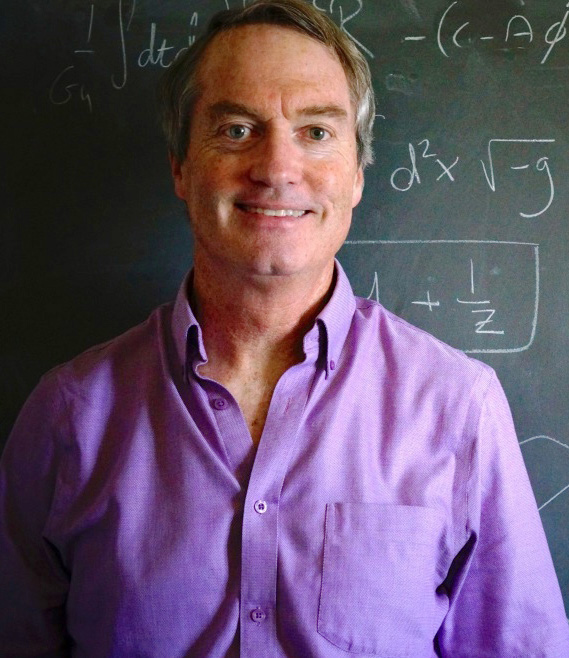 Joseph Polchinski
Joseph Polchinski
Awarded for his transformative advances in quantum field theory, string theory and quantum gravity, distinguished UCSB physicist Joseph Polchinski won the prestigious 2017 Breakthrough Prize in Fundamental Physics, which recognizes major insights into the deepest questions of the universe. Polchinski, a permanent member of the KITP and the Pat and Joe Yzurdiaga Professor of Theoretical Physics, shares the award and $3 million prize with Harvard physicists Andrew Strominger and Cumrun Vafa. They and other recipients of the 2017 Breakthrough Prizes were honored during a gala ceremony with prize founders Sergey Brin and Anne Wojcicki, Yuri and Julia Milner, and Mark Zuckerberg and Priscilla Chan.
“It has been a privilege to spend my career studying fundamental physics, and a joy that I have been able to add new ideas to this subject, including D-branes, the string multiverse and the black hole firewall,” said Polchinski. “The wonderful environment of UCSB and the KITP, and the excellent colleagues here, have contributed much to this continued success. It is an honor to receive the Breakthrough Prize for this work, and to share the recognition with UCSB and KITP.”
“We could not be more proud and pleased for this extraordinary honor for our colleague Joe Polchinski,” said UCSB Chancellor Henry T. Yang. “His research has had a profound impact on our understanding of the universe. As one of the pioneers of the field of string theory, Professor Polchinski has demonstrated tremendous creativity and insight not only in discovering new scientific truths, but also in communicating these complex ideas in a highly accessible and inspiring way.”
String theory posits that the building blocks of reality are tiny vibrating ‘strings.’ Polchinski showed that if you mathematically shrink the space around one class of strings, the space is forced to ‘bounce back’ — that is, to expand again into a larger volume. Only now it’s no longer empty but, rather, a ‘D-brane,’ a multidimensional structure that contains what we normally think of as particles, localized as points on a surface of the brane. That major discovery by Polchinski was one of the ingredients in the holographic principle: the notion that the 3D universe we seem to live in is in fact a 2D projection onto one surface of a vast multidimensional structure.
Polchinski has recently developed another big idea, deriving from the principles of quantum mechanics, known as ‘firewalls’ — blizzards of high-energy particles around black holes. The existence of firewalls would signal a fault line in the foundations of physics: At least one of the two superstar theories of modern physics — relativity theory and quantum theory — would have to be incomplete at a fundamental level.
UCSB theoretical physicist David Gross, winner of the Nobel Prize in Physics in 2004, said of his KITP colleague, “Joe Polchinski’s deep insights and discoveries, from branes to black holes, have inspired theoretical physics for the past decades. He is a jewel in the crown of the KITP and UCSB.”
“I can’t think of anyone more deserving of this recognition than Joe,” said Lars Bildsten, director of KITP. “Not only is he a remarkably brilliant physicist, he is also a wonderful colleague. His excellent mentoring of graduate students and postdoctoral fellows is legendary in the field, and has allowed Joe’s insights and impact to spread across all of theoretical physics.”
Among his many honors, Polchinski has held a Hertz Foundation Graduate Fellowship, a National Science Foundation Postdoctoral Fellowship and an Alfred P. Sloan Fellowship. He was elected a fellow of the American Physical Society in 1997 and of the American Association for the Advancement of Science in 2012. Polchinski is a member of the American Academy of Arts and Sciences and of the National Academy of Sciences. He is the recipient of numerous awards, including the American Physical Society’s 2007 Dannie Heineman Prize for Mathematical Physics; the 2008 Dirac Medal of the International Center for Theoretical Physics, Trieste; and the Physics Frontiers Prizes in 2013 and 2014. Polchinski earned his Bachelor of Science in physics from the California Institute of Technology in 1975 and his Ph.D. in physics from UC Berkeley in 1980. After two-year stints as a research associate at the Stanford Linear Accelerator Center and at Harvard, he joined the faculty at the University of Texas at Austin in 1984 and moved to UCSB in 1992.
- Shelly Leachman, UCSB Public Affairs & Communications
KITP Newsletter, Spring 2017
